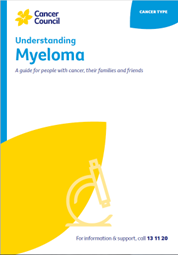Bone marrow aspiration and trephine biopsy
These tests are used to examine cells from the bone marrow. They look for an increased number of plasma cells as well as abnormal plasma cells. You will usually have a local anaesthetic and a mild sedative.
Learn more about:
Bone marrow aspiration and trephine biopsy
For the bone marrow aspiration, a thin needle is used to remove a sample of fluid (aspirate) from the bone marrow – usually from the pelvic bone, but sometimes from the chest. A trephine biopsy, sometimes done with a second needle, removes a small piece of bone with the marrow inside.
The bone marrow samples are sent to a laboratory for examination under a microscope. A medical specialist, called a pathologist, will check the number of plasma cells in the sample and look for any damage to the bone marrow caused by myeloma.
You may also have a bone marrow aspiration and trephine biopsy at the start and end of each course of treatment. By comparing samples, your doctor can see how well the treatment is working.
After a biopsy, you may feel drowsy and have some bleeding and discomfort at the biopsy site. It is a good idea to have someone drive you home after this test.
Genetic tests
The bone marrow sample may be used for various genetic tests – including cytogenetic or chromosomal tests. These tests look at the structure and function of cells. Each cell in the body contains chromosomes, which are made up of genes. These genes control the activities of the cell.
There may be changes in the structure of the chromosomes within myeloma cells. Sometimes part of the chromosome breaks off or goes missing (deletion), or reattaches to another chromosome (translocation). The most common chromosomal abnormalities found in myeloma include t(4;14), t(14;16), del(17p) and del(13q). The changes help classify myeloma as either high risk or standard risk.
Specialised tests, such as fluorescence in situ hybridisation (FISH), can look for changes in the chromosomes. By finding any changed or damaged chromosomes, these tests help the medical team plan the most effective treatment and predict how the myeloma might respond. Ask your doctor which tests are likely to be best for your situation.
Podcast: Tests and Cancer
Listen to more of our podcast for people affected by cancer
More resources
Dr Ian Bilmon, Haematologist, Westmead Hospital and The Sydney Adventist Hospital; Martin Boling, Consumer; Catherine Bowley, Myeloma Support Nurse, Myeloma Australia; Dr Samuel Dickson, Radiation Oncologist, Calvary Mater Newcastle; Rachelle Frith, Clinical Nurse Consultant, Haematology, Prince of Wales Hospital; Dr Wojt Janowski, Haematologist, Calvary Mater Newcastle; Yvonne King, 13 11 20 Consultant, Cancer Council NSW.
View the Cancer Council NSW editorial policy.
View all publications or call 13 11 20 for free printed copies.
Need to talk?
Support services
Coping with cancer?
Speak to a health professional or to someone who has been there, or find a support group or forum
Looking for transport or accommodation?
Help with getting to tests or finding a place to sleep
Cancer information
Blood cancers
Learn about the different blood cancers, such as leukaemia, lymphoma and myeloma
Dealing with the diagnosis
Common reactions to a cancer diagnosis and how to find hope
View our publications
Guides and fact sheets for people with cancer, their families and friends

